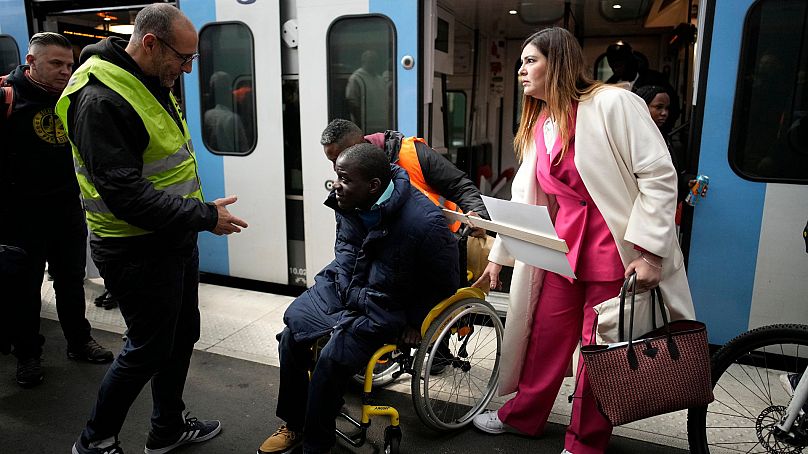France will spend €1.5 billion on improving the accessibility of public places for people with disabilities. The promise was left by President Emmanuel Macron at a conference he organised at the Elysée with several disability associations.
Angry about decades of unmet promises, people with disabilities protested in France Wednesday by showing how difficult and frustrating it is for them to travel alone by train into Paris, delivering a stinging rebuke to government inertia before the 2024 Olympic and Paralympic Games.
President Emmanuel Macron, hosting a national conference on disabilities, conceded failures, noted slow progress, and promised concrete action for France's 12 million people with disabilities, including ahead of the Games.
“This world is not a parallel world,” Macron told the gathering.
“I want this world to end being a world of silence, that people with disabilities be heard, be present and visible everywhere in our society.”
He pledged €1.5 billion to improve accessibility, targeting small establishments receiving the public - from restaurants to administrative locales and taxis, train stations and trains. Details, and a timeline, are to be worked out before the summer.
Macron also promised full reimbursement for wheelchair purchases in 2024.
Today, many disabled people in France face a constant struggle.
In the town of Melun on the outskirts of the French capital, Babou Sene, 31, had to get out of the wheelchair he uses and shuffle with help down and then up two flights of stairs to catch the 11:15 suburban train to Paris' Gare de Lyon, which connects to the only fully accessible Metro line in the future Olympic host city.
Other people with disabilities had to stay behind, continuing the protest with placards denouncing limited access to public services. Their electric-powered wheelchairs were too bulky to be carried to the Paris-bound train platform. Helpers carried Sene's smaller hand-pushed chair and assisted him on the stairs and navigating the gap between the platform and the train.
“It's frustrating, really frustrating, not being able to get around,” Sene said. “The feelings are of anger, frustration, revolt and resignation. Because in fact, despite the fights undertaken, the impression we have is that we're not listened to, despite all of our efforts.”
Just getting to the conference at the presidential Elysee Palace would be an ordeal for many of the people the event is focused on, because of very limited accessibility on the Paris Metro and frequent frustrations for people with disabilities on the French capital's supposedly fully accessible buses.
The RATP, the metro authority, has said that 32 stations, out of more than 300, will be accessible by the Olympics.
This month, an arm of the Council of Europe, the continent’s foremost human rights body, found France in violation of a European treaty on social and economic rights, citing multiple failings in meeting the needs of adults and children with disabilities.
Olympic organisers say the host city will “provide the best possible conditions for para-athletes and visitors with disabilities.” They say they’re aiming for “an obstacle-free experience for all,” with 100 per cent of venues to be accessible for people with disabilities and all volunteers to be trained in serving their needs so as to “avoid users feeling that they have any kind of disability.”
But other Olympic cities have done better in improving accessibility in their subways. In Tokyo, more than 90 per cent of the 758 subway and rail stations were already wheelchair-accessible when it hosted the Olympics in 2021.












